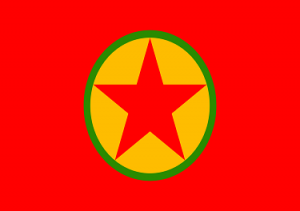 The Kurdistan Workers’ Party began as a left-wing Kurdish student organization founded by Abdullah Ocalan in 1978. Initially a Marxist-Leninist and radical leftist party, the PKK engaged in armed struggle in Turkey to promote the formation of an independent Kurdish state from 1984-2000. After the capture and imprisonment of longtime leader, Ocalan, the PKK agreed to a ceasefire and committed to non-violent solutions to the Kurdish question in Turkey. The group briefly changed its name to the Kurdistan Freedom and Democracy Congress (KADEK), before returning to the original label in 2005. During his time in prison, Ocalan altered his political views significantly, becoming more influenced by libertarian socialist thinkers, in particular Murray Bookchin. His ideology of democratic confederalism was adopted by the PKK, changing the group’s fundamental approach to politics and social change. The PKK looks to pursue an equitable and democratic confederation within the boundaries of the existing nations in which Kurds reside. Violence resumed in 2005 when the PKK declared an end to the ceasefire, citing Turkish military violations of the agreement and increasing attacks on Kurdish villages. Despite attempted peace negotiations in 2013-15, the PKK continues to fight the Turkish state for Kurdish rights. The PKK has also contributed heavily to the development of the Kurdish-dominated autonomous region in Syria, which has implemented Ocalan’s socio-economic philosophy on a societal level. The PKK is designated as a terrorist organization by the United States, the European Union, and Turkey.
The Kurdistan Workers’ Party began as a left-wing Kurdish student organization founded by Abdullah Ocalan in 1978. Initially a Marxist-Leninist and radical leftist party, the PKK engaged in armed struggle in Turkey to promote the formation of an independent Kurdish state from 1984-2000. After the capture and imprisonment of longtime leader, Ocalan, the PKK agreed to a ceasefire and committed to non-violent solutions to the Kurdish question in Turkey. The group briefly changed its name to the Kurdistan Freedom and Democracy Congress (KADEK), before returning to the original label in 2005. During his time in prison, Ocalan altered his political views significantly, becoming more influenced by libertarian socialist thinkers, in particular Murray Bookchin. His ideology of democratic confederalism was adopted by the PKK, changing the group’s fundamental approach to politics and social change. The PKK looks to pursue an equitable and democratic confederation within the boundaries of the existing nations in which Kurds reside. Violence resumed in 2005 when the PKK declared an end to the ceasefire, citing Turkish military violations of the agreement and increasing attacks on Kurdish villages. Despite attempted peace negotiations in 2013-15, the PKK continues to fight the Turkish state for Kurdish rights. The PKK has also contributed heavily to the development of the Kurdish-dominated autonomous region in Syria, which has implemented Ocalan’s socio-economic philosophy on a societal level. The PKK is designated as a terrorist organization by the United States, the European Union, and Turkey.
Kurdistan Workers’ Party (PKK)
2K
